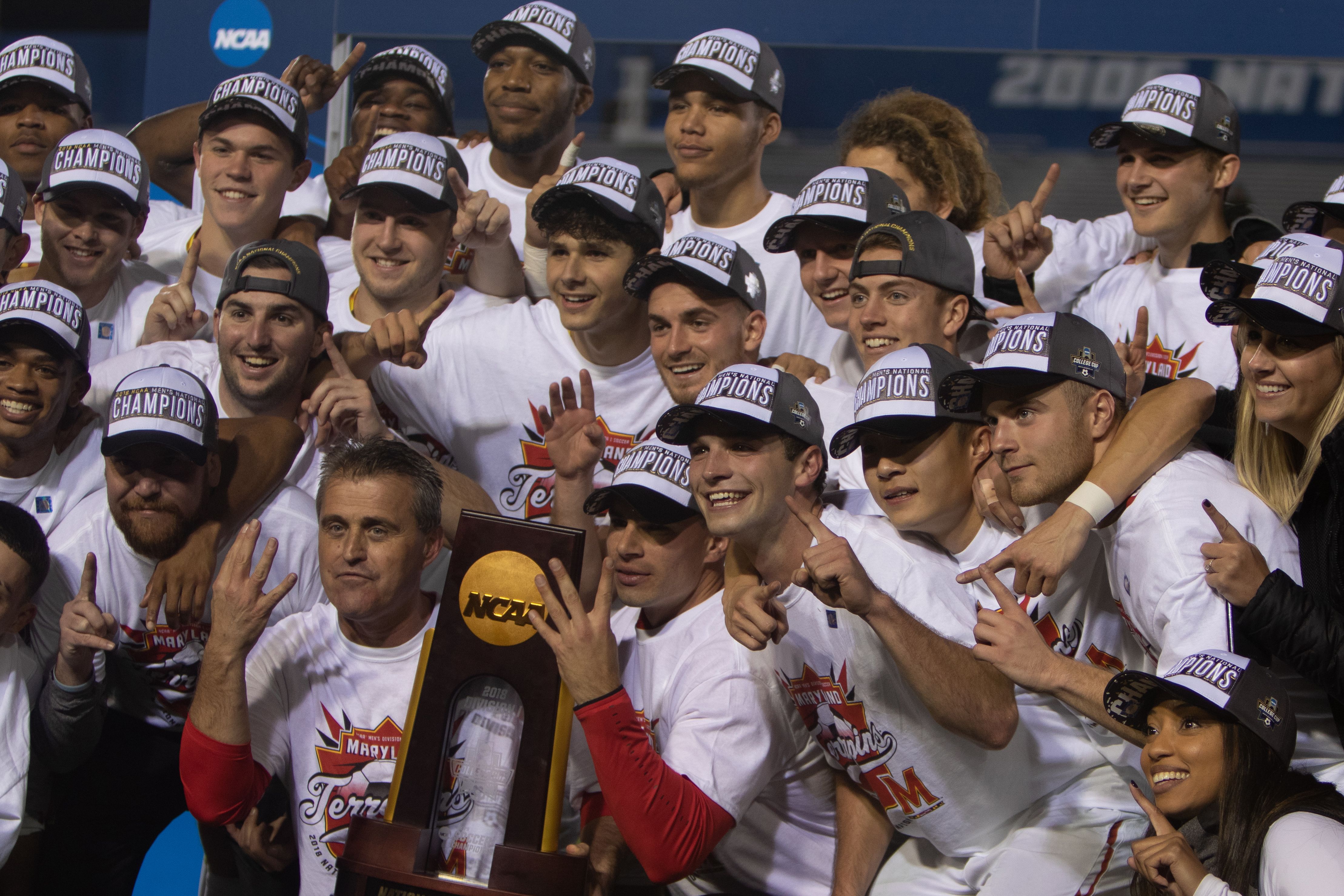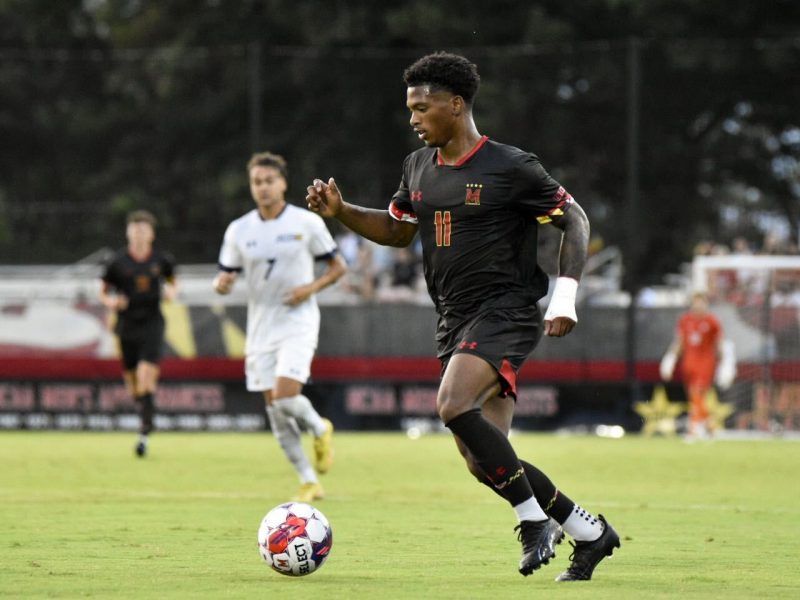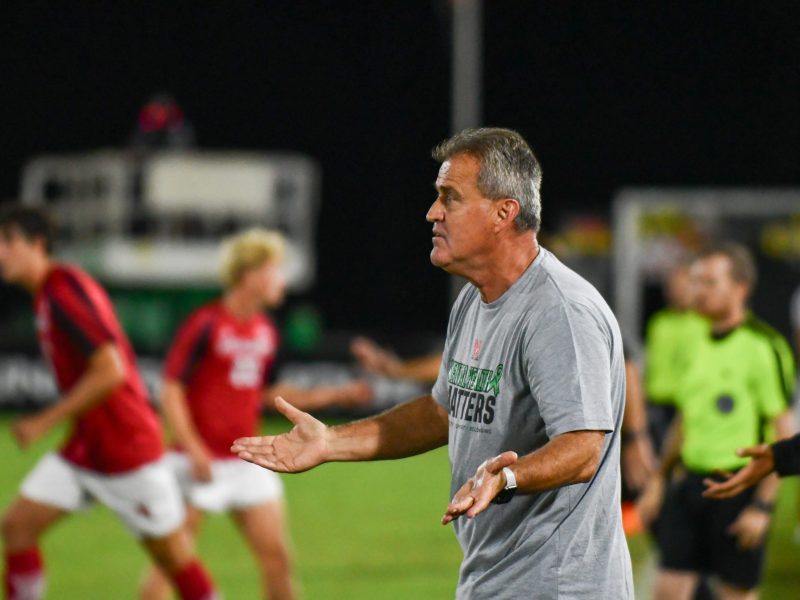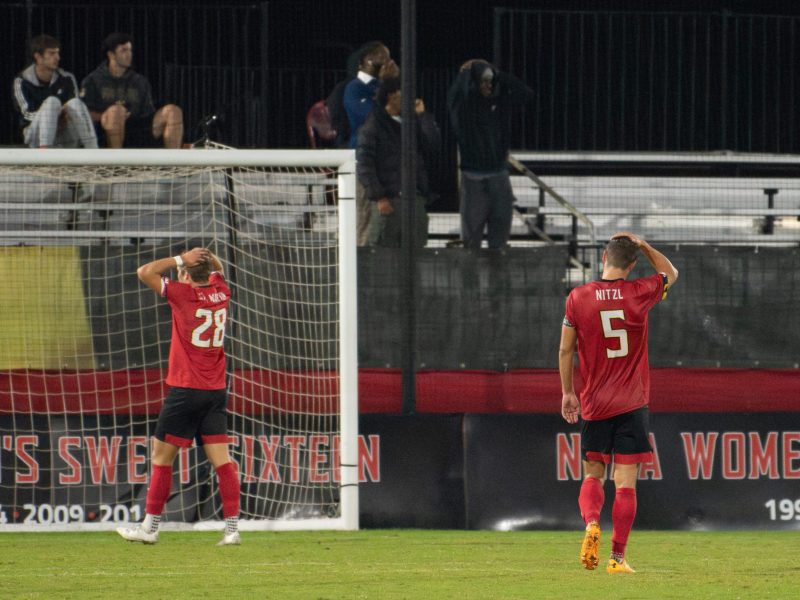This wasn’t supposed to be Maryland men’s soccer’s year, but on Dec. 9 — three months removed from a goalless 0-2-2 start to the season — the reality began to set in.
In the 57th minute of the national championship against Akron, midfielder Amar Sejdic converted a penalty kick, putting the Terps ahead 1-0 and prompting two smoke cannons to erupt behind the net. Thirty-three minutes later, the postgame pandemonium ensued.
As the clock hit zero, the bench raced from the sidelines onto the field at Harder Stadium. Paul Bin tackled Eli Crognale at midfield, and William James Herve and Alejandro Chacon drenched coach Sasho Cirovski in yellow Powerade, moments before the team received national championship apparel emblazoned with the Maryland logo.
Sejdic and Andrew Samuels hoisted the program’s first national title trophy in a decade as their teammates danced behind them with their pointer fingers aimed into the sky. Confetti shot high above the No. 11-seeded Terps, creating a blue-and-white sea where Eric Matzelevich and Alejandro Chacon euphorically performed snow angels.

Goalkeeper Alejandro Chacon makes a confetti angel after Maryland men’s soccer’s 1-0 win over Akron in the NCAA championship game at Harder Stadium in Santa Barbara, California, on Dec. 9, 2018. (Courtesy of Angelica Banks/Daily Nexus)
Such a celebration seemed unlikely back in August, when Maryland began the season unranked for the first time in 17 years. But it was one the Terps envisioned well before they turned hardships into hardware to bring the program’s fourth national championship back to College Park.
“We talked about this being a big moment for our program,” Cirovski said. “A good story of overcoming adversity and reestablishing our culture, our identity and redeeming ourselves.”
Two days after the 2017 season concluded, Cirovski met with his returning players to make clear how urgent it was for the program to remeet its standards. Two consecutive seasons had ended without an NCAA tournament win, and for a team rooted in the word “Excellence,” the swift decline was anything but that.
The national expectation to contend for a championship suddenly vanished. Maryland’s absence from the rankings appeared warranted when the squad went winless in its first four games and didn’t find the net in its first 476 minutes. But those struggles fit the script for a season defined by countless moments of redemption.
[Read more: Amar Sejdic took Maryland soccer to the national title game. Then he won it.]
The senior class lost in the NCAA quarterfinals as freshmen, then endured a pair of atypical first-game exits the next two years. This season was defender Chase Gasper’s last chance to return to the national championship game after making it there with UCLA in 2014. For Bin, who didn’t think he’d touch the field again after battling depression, it was an opportunity to prove he belonged in the starting 11.
The winless start wasn’t part of the plan, but overcoming adversity was. Cirovski’s recent teams got by mostly on talent instead of toughness, the latter a trait he wanted to invoke in his 2018 squad. So, he constructed what became the second-most challenging regular-season schedule in the country, with 10 of the Terps’ 16 games against teams that ended up making the tournament.
“It’s tough to teach young men what’s wrong when they’re winning,” Cirovski said Dec. 4, before the College Cup. “That really hurt us. This year, through some of the losses and the ties, we were able to really figure out what to strengthen.”

Midfielder Amar Sejdic makes a pass during Maryland men’s soccer’s 2-1 loss to Wisconsin at Ludwig Field on Sept. 21, 2018. (Alex Chen/The Diamondback)
Even when the results gradually turned positive, the negative ones mattered most for a team that needed to relearn what it took to win. Two midseason losses in which the Terps conceded 90th-minute goals did just that.
A blown lead with 53 seconds left on Sept. 21 against Wisconsin proved costly. After the Badgers won in double-overtime, a visibly unhappy Cirovski sent his players directly to the locker room for the postgame discussion that’s typically held on the field.
The Terps regrouped in consecutive blowout wins, but then regressed in a three-game winless skid. The nadir was a loss at Indiana, where Maryland allowed the winning score with 18 seconds left in regulation.
Falling to the Hoosiers dropped the Terps’ record to 4-5-3 with four games left, and a sub-.500 finish would make the team ineligible for the NCAA tournament. To that point, they’d taken pride in competitive efforts against the nation’s best teams. But the time for moral victories was over.
“‘Good enough’ is not good enough now,” Bin said after the game. “We’ve come to a point where we need to pick up results now.”
[Read more: 3 attacking subs changed the national title game for Maryland men’s soccer]
The loss in Bloomington proved to be the final turning point of the season. A must-win attitude ignited a 9-1-1 finish, with the Terps scoring in each of those 11 games and posting a clean sheet in eight of them.
Maryland won three of its last four contests in the regular season to bring momentum into the Big Ten tournament, where it upset Michigan State before falling to Indiana again. Despite a mediocre record, the Terps’ No. 12 RPI and No. 2 strength of schedule earned them the No. 11 overall seed in the national tournament.
“I guarantee we surprised a lot of teams based on being No. 11,” Sejdic said two days after the bracket release. “But when you see the type of players we have in the system, then it shouldn’t be a surprise, because we’re capable of beating anybody.”
The senior captain wouldn’t regret his words. With each win in the NCAA tournament, the stories of redemption told themselves.

Defender Chase Gasper cuts back around a defender during Maryland’s 2-0 win over NC State in the second round of the NCAA tournament at Ludwig Field on Nov. 18, 2018. (Corey Hart/The Diamondback)
In the second round, Maryland dominated NC State en route to a 2-0 win at Ludwig Field, absolving the team from its home tournament losses in the previous two years. The same scoreline a week later at No. 6-seed Duke convincingly advanced the Terps to the quarterfinals for the first time since 2015.
It was the seniors’ perfect opportunity to rectify the Elite 8 loss from three years earlier, one still fresh in their memories.
“We came so close,” Sejdic said Nov. 28. “At the time, I didn’t even realize we were just one shot on target or even a penalty away from making it to the College Cup.”
With that defeat in mind, Maryland marched into Lexington and shocked No. 3-seed Kentucky, which hadn’t trailed, lost or been shut out at home all season. The 1-0 win sent the team to the College Cup for the first time since 2013.
The Terps’ 2008 national championship team — nicknamed “The Gold Standard” — gave up only one goal in their title run. This year, Maryland did even better, finishing the season on a 499-minute shutout streak. It was a testament to all 11 players contributing defensively in front of goalkeeper Dayne St. Clair.
“If you look at teams that win championships, teams that go far, they are among the best teams in the nation defensively,” Cirovski said. “It’s something we haven’t been the last couple of years.”
[Read more: USMNT names former Maryland goalie Zack Steffen its Male Player of the Year]
Another clean sheet in the national semifinal reversed Maryland’s two prior negative results against No. 2-seed Indiana. Cirovski said it was an additional chapter in the season’s redemption tale.
When the final whistle blew, Bin dropped to the ground and cried, just as many of the Hoosiers did. Two years after withdrawing from the program to focus on his mental health, he felt reaching the national championship proved how far he had come.
“After our win against Indiana, [I] was extremely emotional because all the hardships I had faced,” Bin said. “I knew that I had conquered and beaten them.”
The win was Maryland’s third over a seeded team in the tournament, and all that stood in the way of the most important victory was unseeded Akron. The Zips had been on their own unforeseen run, knocking off No. 1-seed Wake Forest and three-time defending national champion Stanford.
The Terps used Sejdic’s penalty kick to claim the program’s fourth trophy, 50 years after the first one and 10 years after the last one. Not only did Maryland achieve its goal of resetting its identity in one year, the team it re-established the lofty expectations for Cirovski’s program.
“This has been the epitome of Maryland soccer this year, “ Cirovski said. “Reestablished, reidentified, and to be the last team smiling, is the happiest you can possibly be.”



